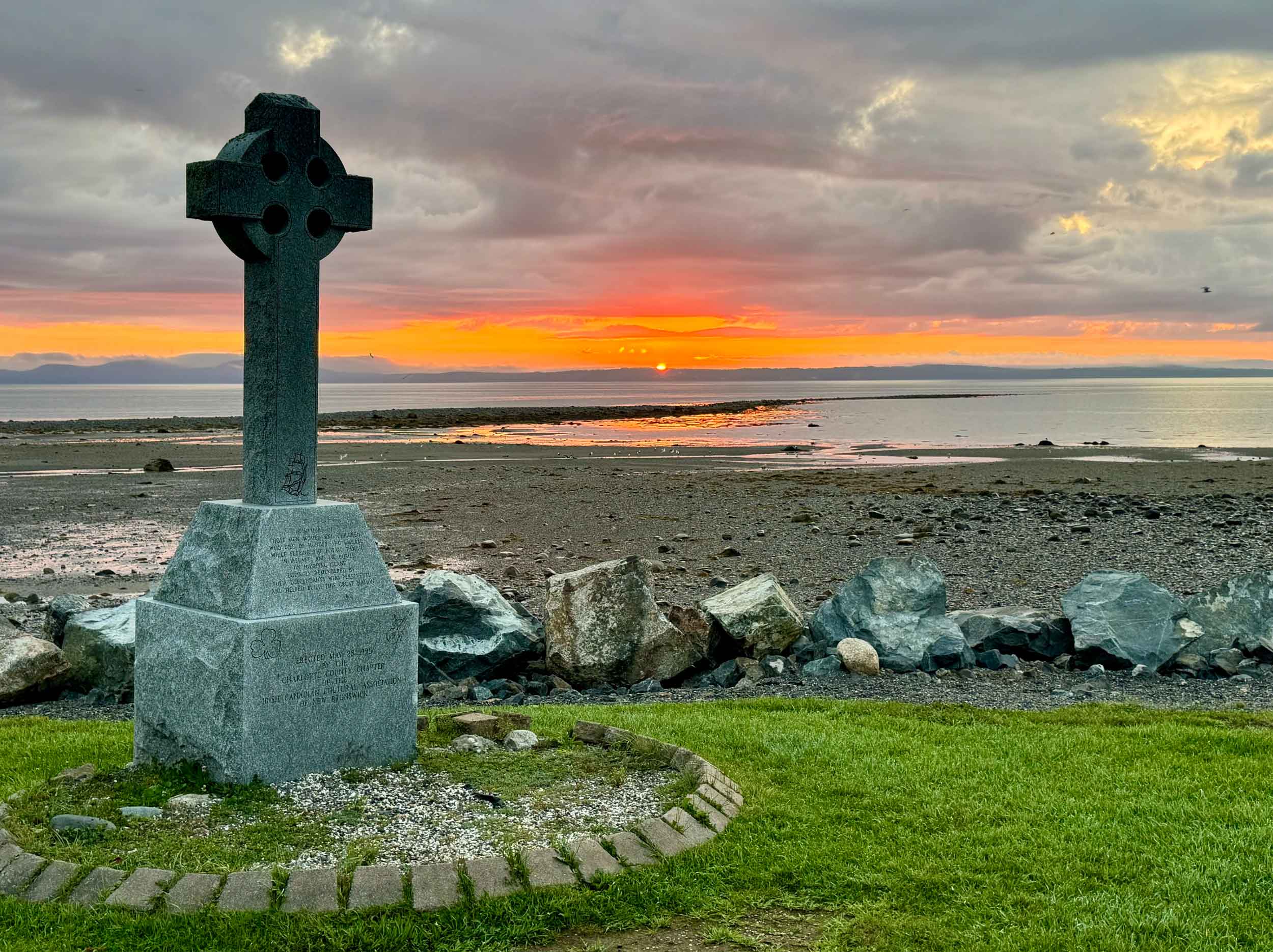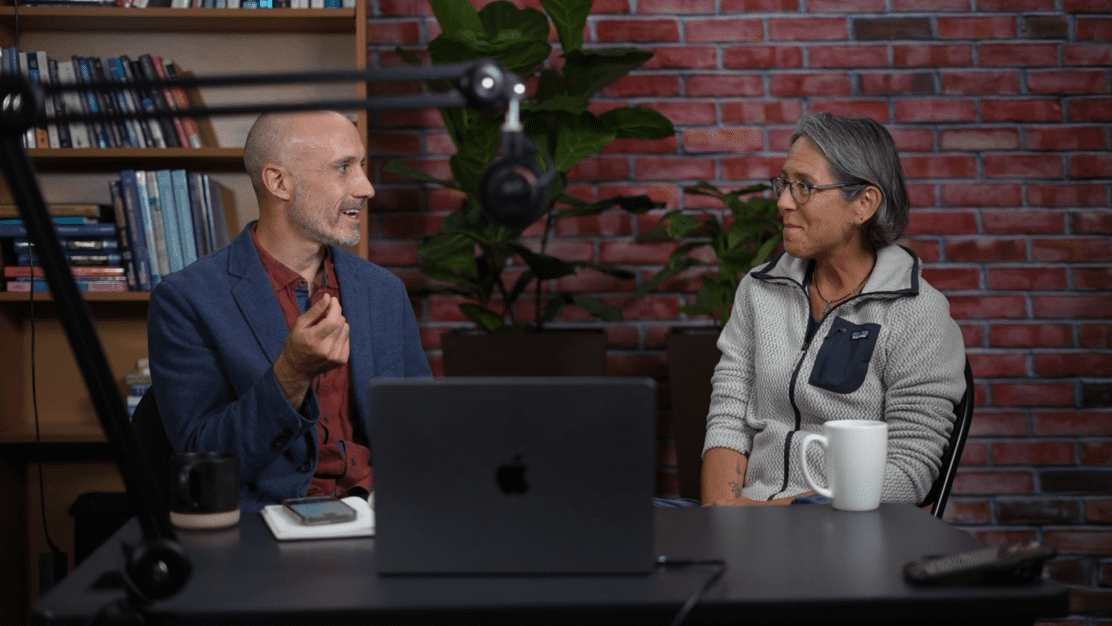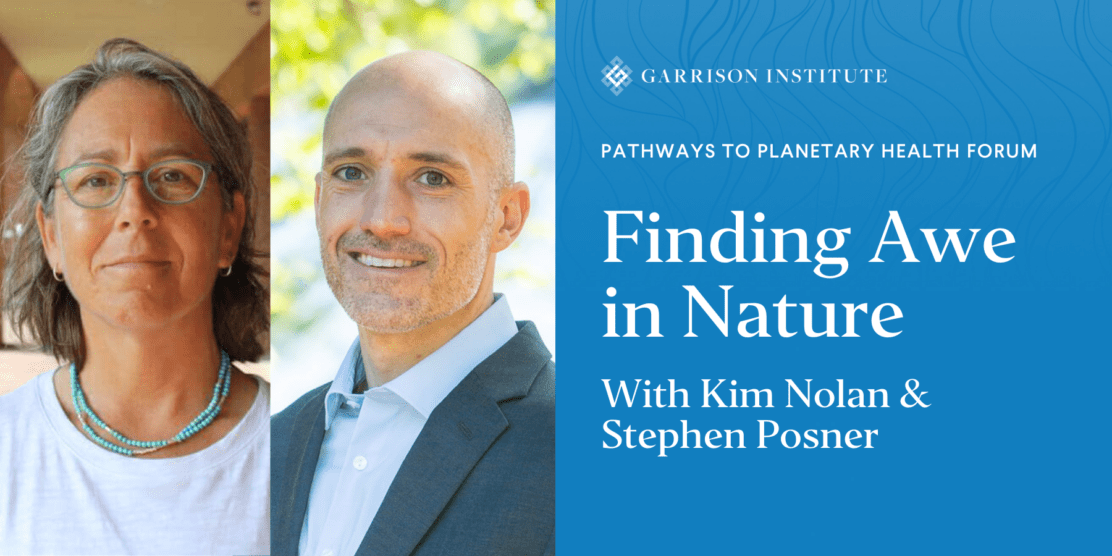Finding Awe in Nature
By Stephen Posner in conversation with Kim Nolan
When we encounter adversity, stress, or a rapidly changing world, finding moments of awe can provide powerful medicine.
Whether it’s the expansive grandeur of a mountain vista, the intricate beauty of a flower in bloom, or a moment of mystery during common occurrences – experiencing awe can shift our perspective, grounding us in the present moment and reconnecting us with the world.
In a recent conversation with Kim Nolan, an educator and pioneer in contemplative leadership and inner sustainability at the University of Vermont, we explored “capital A” Awe in terms of the grand, life-changing experiences of beholding the mystery of life, and “lowercase a” awe in the more subtle, everyday moments that invite us to pause and consciously reflect.
Awe in Everyday Life
While we often associate awe with monumental events, Kim highlighted the importance of “lowercase a” awe in small moments that occur every day, often unnoticed. These experiences can be as simple as witnessing a sunset, feeling the wind, or walking a path. These moments are not just fleeting experiences; they are accessible and meaningful opportunities for personal growth. By paying attention to the subtle facets of life, we can cultivate relationships with the world based on gratitude, respect, and compassion.
“Lower case ‘awe’ is the space between sacred and ordinary, or soft curiosity and soft joy… I don’t get out to the Grand Canyon very often, but I have ordinary life every day.” –Kim Nolan
Awe, Kim explained, plays a crucial role in preserving a sense of personal choice and agency. Awe can be a transformative lens , allowing us to see circumstances as part of the beauty that exists beyond understanding. Awe can help us navigate life’s challenges by shifting our mindset from scarcity to abundance, from stress to calm, and from force to tenderness and wonder. In these ways, awe is a vital resource for times marked by VUCA (volatility, uncertainty, complexity, ambiguity).
The Intersection of Awe and Education
Kim’s work with the Sustainable Innovation MBA program at the University of Vermont helps business school students develop as “change agents” – leaders who are equipped to address pressing environmental and social challenges. An important aspect of this work is integrating mindfulness and inner sustainability into the MBA curriculum, encouraging early career business leaders to pause, reflect, and embrace the space between ordinary and sacred moments.
Awe can serve as a tool for deep, experiential learning in many types of educational settings. By cultivating awe through personal experiences, students can engage with complex ideas in a way that goes beyond cognitive understanding. Both Stephen and Kim promote the importance of “knowing” and “not knowing” in learning.
“Not knowing is part of being open to possibility, being curious, maybe being grateful, lifting gaze to the horizon for possibility.” –Kim Nolan
A practical approach to fostering awe in our lives is to create opportunities to immerse in the natural world. For example, this past summer, Pathways to Planetary Health partnered with Ulnooweg, an Indigenous-led organization that serves Mi’kmaw communities, to engage First Nations youth, educators, and Elders in ocean-based education. We learned from Earth as teacher while consciously exploring the tidal coastlines of Atlantic Canada.

We celebrated awe by inviting these Indigenous youth to reflect on their own experiences of natural wonder and mystery through art, science, group dialogues, and play. By nurturing a sense of awe, we can encourage people to think deeply, act compassionately, and connect with the world in a more meaningful way.
Awe in Ancestral Encounters
One of the most profound ways to experience awe is when we are able to connect with lineage. Environments provide access to experiencing Earth as ancestral. Built and natural environments can be conduits of human history that help us step inside the lives of our ancestors. These encounters can deepen our appreciation for the shared highs and lows of human experience.
Kim spoke about her journey to the sites of the former German Nazi concentration camps at Auschwitz-Birkenau with a Zen Peacemakers community, including Israeli and Palestinian spiritual leaders, after she was ordained as a Buddhist chaplain. Even with the solemnity of being in a place of such suffering, specifically for someone of Jewish background, she described being in awe of the resilience of the human spirit amidst such depravity. She felt connection with all people in shared grief and sorrow, as well as signs of hope in the human and more-than-human life that persevered through the rubble.
Earth and the Cosmos
We can also experience awe and a sense of belonging that is less anthropocentric by looking beyond the terrestrial and human scale. For example, viewing the night sky can easily draw one into contemplating the vastness of the cosmos, the inherent beauty of the universe, and the ancestral light we receive from incomprehensibly distant celestial bodies.
It is also easy to imagine our ancestors feeling similar curiosity and wonder when looking up at the night sky. Gazing at stars is not just about being in “capital A” Awe at the cosmos. Changes in the sun’s day-to-day patterns and the rhythms of constellations and Earth are pragmatic and foundational for the human experience of time’s arrow.
Moments of awe with the universe ground us in the knowledge that we are part of something much larger than ourselves— a kind of collective consciousness that spans time and space.
Awe is an invitation to be in relationship with the world, to honor its wonders and behold the mystery. Whether it’s cosmic awe or the resilience of the human spirit, these moments remind us of larger forces that shape our lives.

Being in Awe
In times of environmental and social upheaval, awe can be powerful for cultivating resilience. Kim shared a belief that awe helps individuals “right-size” their sense of self, allowing them to navigate difficult situations with humility and openness. Rather than seeking control or certainty, awe is an invitation to become comfortable with the unknown, to stay curious, and to move forward with compassion.
I shared a story about a daughter’s curiosity with the world. One early winter morning when she was about 4 years old, she observed steam arising from a cup of tea and asked “What’s that?” Rather than name or define for her – which can cause wonder to evaporate – I replied “I don’t know. What are you noticing?” The reply in the form of a question stoked curiosity, invited conscious observation, and enabled her to continue simply being with the mystery.
The next morning, my daughter looked at fog outside and theorized that fog might be related to the mystery from the cup of tea. She observed that clouds in the sky can behave similarly. Her genuine, childlike wonder enabled her to creatively see relationship – an important source of resilience and groundedness when facing the unknown.

As we endeavor to navigate the complexities of the modern world, moments of awe that can arise from a cup of tea offer us a vital source of renewal. But where does awe come from?
“I don’t think awe comes from anywhere. It always exists. We are in it or not to varying degrees.” –Kim Nolan
No matter where or how it is found, true awe reminds us of the boundlessness of the human spirit and the interrelatedness among all things. Awe can be a gateway to being fully alive in this world, and it holds the potential to transform both individuals and societies. By fostering opportunities for awe in our lives – especially in educational settings – we can cultivate resilience, creativity, and compassion while engaging in planetary healing.
—
Stephen Posner, PhD is Director of the Pathways to Planetary Health initiative at the Garrison Institute. His work applies scientific inquiry and contemplative practice across traditions to create a compassionate and resilient world. He brings together research and education in astrophysics, ecology, and economics with retreats in Zen communities and ceremony on the land. Currently, Stephen serves as contributing author for the first U.S. National Nature Assessment, conducts research on relationships across mindfulness traditions, and develops partnerships to address planetary health in the Hudson Valley of New York.
Kim Nolan, PhD is an ordained Buddhist chaplain and a lifelong advocate for social justice and human rights. She served as an appointed member of the Vermont Commission on Women and as board member on several national and local non-profit organizations. Kim facilitates training, provides coaching, and guides diverse teams through strategic vision and action planning. She is the Founder and Director of the Dignity Foundation, working at the intersection of cultural transformation, leadership & change management, and contemplative science. Prior to this work, Kim served as Professor and Program Director of Mindfulness Studies at Lesley University, Program Officer of the Mind and Life Institute – where she designed an Academy of Contemplative and Ethical Leadership – and Department Chair of Integral Psychology and founder of the Institute of Contemplative Studies at Burlington College in Vermont. Kim holds a Ph.D. in Leadership and Change from Antioch University and a M.Ed. from Boston University in Counseling Psychology.
